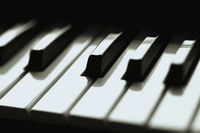Piano Sheets > David Baker Sheet Music > Kentucky Oysters (ver. 1) Piano Sheet
Kentucky Oysters (ver. 1) by David Baker - Piano Sheets and Free Sheet Music

About the Song
Other avaliable versions of this music sheet: Version 1 Version 2
The joy of reading piano notes Music is said to be the best medicine developed by nature. The thought and feel is said to have the power to bring back the dead. While playing music gives you the joy you just cannot contain, same is the case with reading piano music sheets. After all, it is sheet music which tells you exactly how to play that favorite tune of yours.
Many feel that reading piano music sheets is an ardent task. Well, this is exactly where are all wrong. It is certainly not the case that one glance and you will understand what is written in that sheet music. But it is certainly not as difficult as expected! Sheet Music is the language of expressing music in a readable form. And just like to learn a new language you need dedication and perseverance, same is the case with (More...)
Download this sheet!
About the Artist

Random article
The joy of reading piano notes Music is said to be the best medicine developed by nature. The thought and feel is said to have the power to bring back the dead. While playing music gives you the joy you just cannot contain, same is the case with reading piano music sheets. After all, it is sheet music which tells you exactly how to play that favorite tune of yours.
Many feel that reading piano music sheets is an ardent task. Well, this is exactly where are all wrong. It is certainly not the case that one glance and you will understand what is written in that sheet music. But it is certainly not as difficult as expected! Sheet Music is the language of expressing music in a readable form. And just like to learn a new language you need dedication and perseverance, same is the case with (More...)
